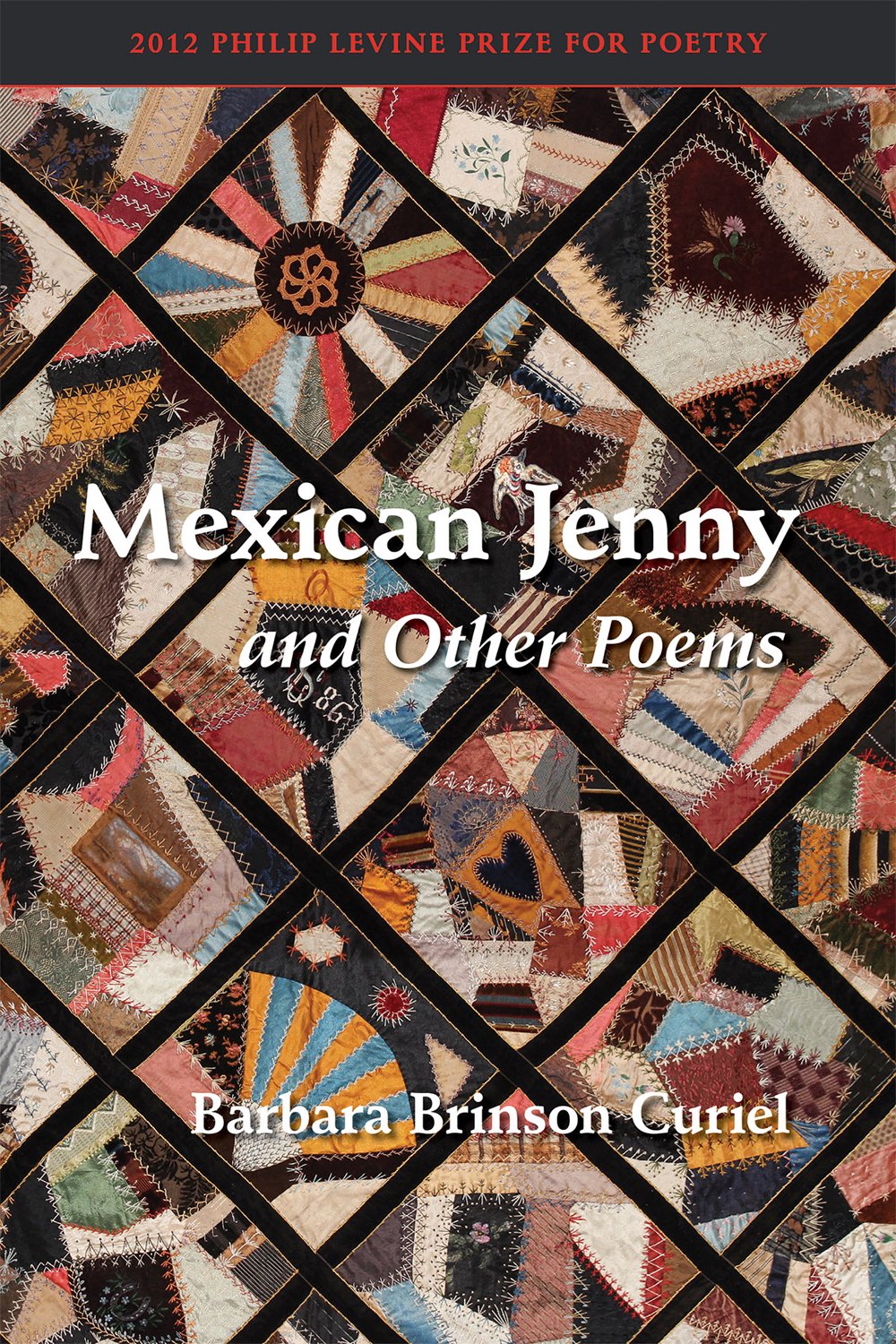
Mexican Jenny by Barbara Brinson Curiel
Levine Prize in Poetry (2012)
Artist's Statement:
Throughout my writing career I have been interested in the stories that lie submerged below and between other narratives. Many poems in this collection tell stories that are the subtext, that are at the substrata, of other more dominant stories. These poems examine the domestic, the working class, and both the private individual experiences and the unrecognized histories of Latina women.
I came upon the story behind the title poem, "Mexican Jenny," in a back issue of a textile arts magazine. A short article announced a quilt exhibit that included a crazy quilt Jenny made in the 1920s, when she was incarcerated at the prison in Cañon City, Colorado.
According to the article, Jenny had been a prostitute in Cripple Creek, a gold mining town, and she killed her husband after he beat her up for not bringing home enough money. She was convicted of murder, and in prison made a quilt from her working girl clothes, complete with the embroidered image of her dead husband. When she contracted tuberculosis in prison, the quilt was sold and the money used to send her to Mexico where she died.
This story haunted me. I wanted to know who this woman was, what brought her to Colorado, and what brought her into "the life." I used the bare bones of this story and began to flesh it out with my own imaginings.
I also researched the lives of prostitutes in western mining towns and eventually learned some of the facts of the real Jenny's case. I found the historical record's contradictions and improbabilities to be essential to the story, so I wove them into my poem. Because of these conflicts of fact, folklore and interpretation, I have given her story three different endings, told in multiple voices.
Are we the stories told about us, or the stories we tell ourselves? Barbara Brinson Curiel's Mexican Jenny, a fine, crazy quilt of a first book, is her wise and wistful reply. Gaze into the mirror of her lines long enough, and you may find yourself, blinking back. -- Cornelius Eady (Miller Family Chair, Professor of English and Theater, The University of Missouri-Columbia)
Barbara Curiel's poetry submerges us in the interior landscapes of the everyday and the mythic: the empty vessels of pots and cans blessed in a family kitchen, the wolf-blood-stained apron of Red Riding Hood's grandmother, a quilt stitched in a jail cell by a woman "mining gold / from the dirt of my life." At the heart of this collection which offers up an "Ars Domestica" of a poet's life is "Mexican Jenny," Curiel's imaginative re-telling of the story of Jenny Wenner, a prostitute convicted of killing her abusive husband in Cripple Creek, Colorado in 1913. This structure serves to remind us all how at the center of every "Mexican" woman's life are the undocumented lives of "ragged men buried daily in the mines / and women whose every mouthful depended / on what was brought to the surface." Here is an illuminating work that unearths and pays lyrical tribute to the labor of brown women across borders and other divides. -- Deborah Paredez (author of This Side of Skin and co-founder of CantoMundo)
Master poet Barbara Brinson Curiel wields all the stunning power and raw honesty for which she is best known. This collection is both delightful and unsettling, ranging from fables for a modern world to the hard-hitting title poem, "Mexican Jenny," to the incomparable and captivating slice of culture in poems like "Recipe: Hinterland Tamales," with a spicy sprinkling of humor throughout. The language is direct -- bare and beautiful. In "Immigrant Partoum," Brinson-Curiel both follows religiously and simultaneously shatters and alters the form of a pantoum, as immigrants' lives follow, reflect, shatter, and alter the form of a native community. A delicious dessert of poetry for the modern world -- and as full of surprises as it is of truth. Bravo to Brinson-Curiel's brave new world of poetry! -- Carmen Tafolla, Ph.D. (Poet Laureate, City of San Antonio)
Curiel's debut book of poetry, Speak to Me from Dreams (1989), prompted acclaimed poet Lucille Clifton to remark that "Curiel speaks to us from the richness of two languages but in one magical voice." This second book, a quarter-century in the making, marks Curiel's return to verse and affirms Clifton's early observation... A superb second book that hopefully signals more books to come from this smart and talented poet. -- Diego Báez, Booklist
Mexican Jenny
1.
Girls like me
come from alleys
from dirt floors
from cold kitchens
from one thin blanket.
Girls like me
come from fists
from passing strangers
from wandering fathers
from mothers with one heel
hooked on the bar stool.
Girls like me
come from drought
from war.
2.
When I was a child in Acapulco
I worked for a rich family
sweeping their kitchen
washing their dishes.
One day, after a few nips, the cook,
who was my mother's friend,
had said, Come, work for me
in the big house.
I stood on a wooden box
washed dishes stamped with indigo
trees and flowers, with birds
like none I'd seen.
I stood elbow
deep in dirty water, dreamed
of far places without greasy pans
nor the boss's wandering hands.
3.
The boss's wife had a red
silk shawl embroidered
with many-colored swallows.
She draped it like a flag on the back of her chair.
It had come on a ship from Manila,
from that land of ship builders and sailors,
of travelers who, years before, brought
Chinese porcelain and silk to Acapulco.
Every time I walked by
I fingered its edges
and felt like I was dipping my fingers
into the tide.
After I'd found the fault lines
in one cup too many,
when I'd daydreamed one
dish too many to pieces,
the cook ran me off,
but not before I'd pinched that shawl,
wrapped it around my waist
under my dirty skirt.
Running home
the silk rubbed
my legs,
a river current.

